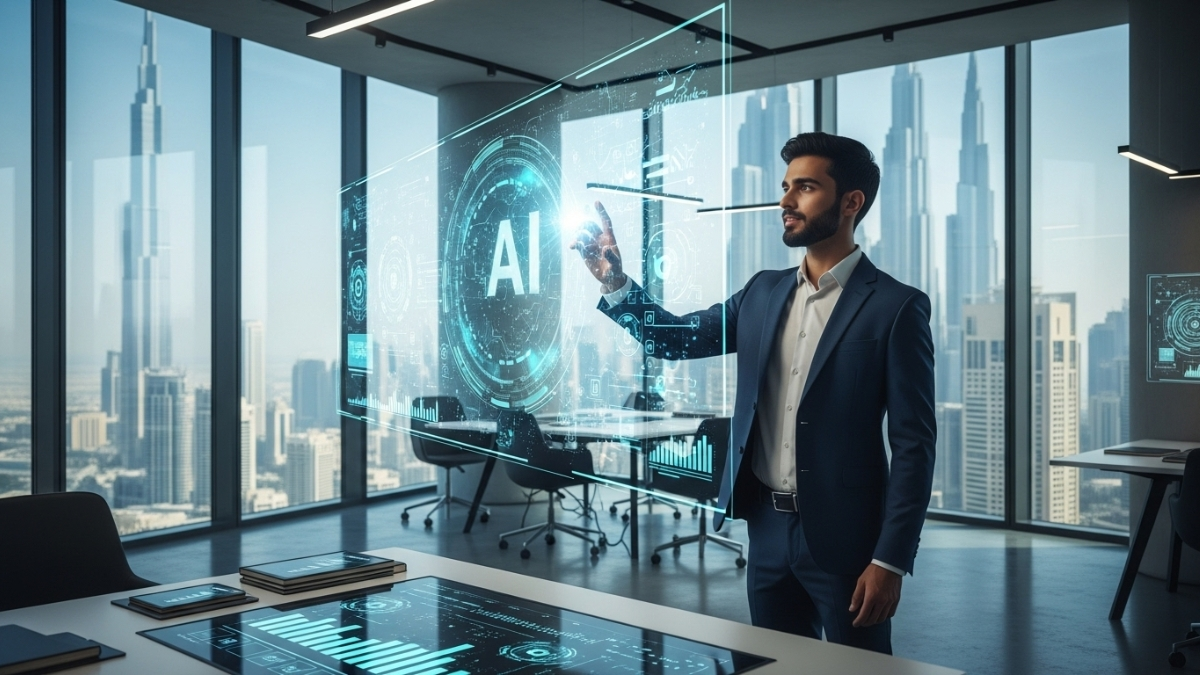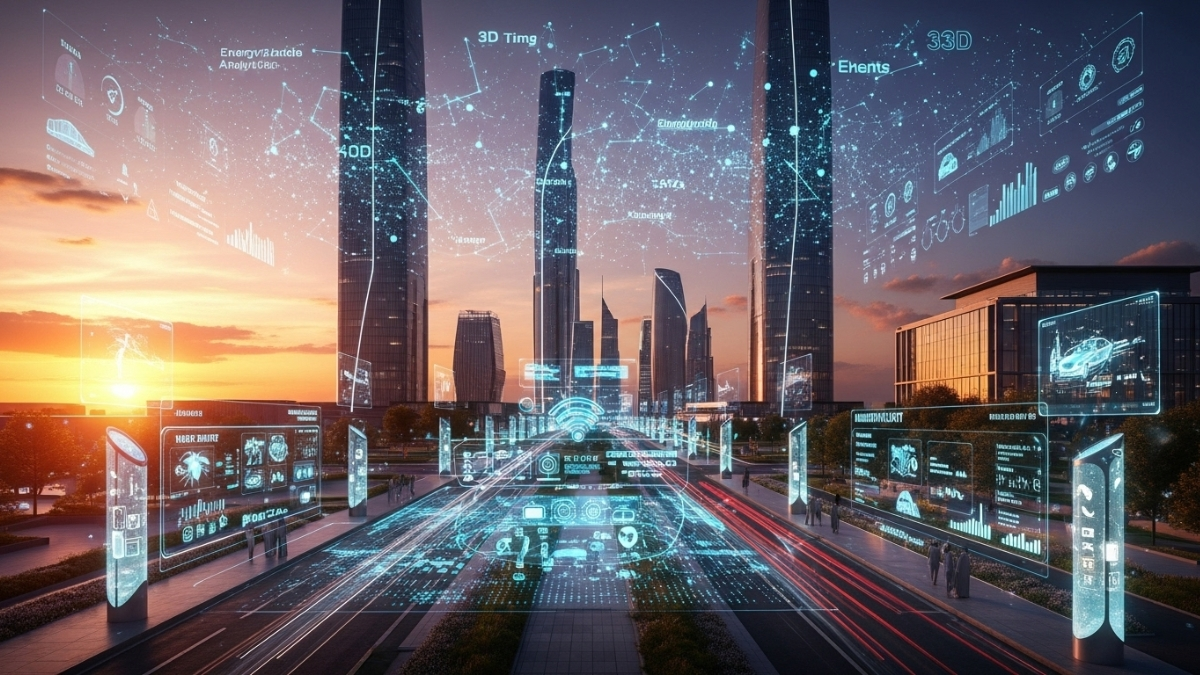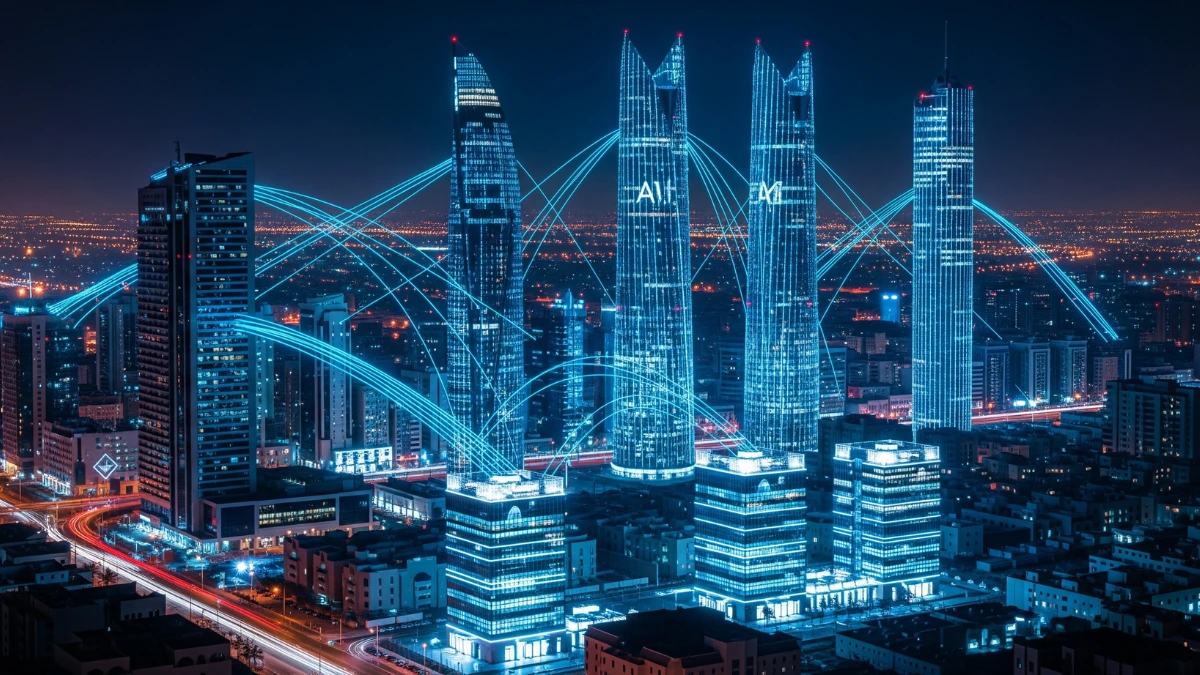أتذكر تجولي في الحي المالي في الرياض قبل بضع سنوات فقط. كانت الطاقة تدور حول ناطحات السحاب الجديدة والصفقات التجارية الكبيرة. أما الآن، عندما أزورها، يبدو الحديث مختلفاً. إنه أكثر هدوءاً وأكثر رقمية. إنه يتعلق بالبيانات والخوارزميات وشيء يتحدث عنه الجميع: الذكاء الاصطناعي أو الذكاء الاصطناعي.
يبدو الأمر وكأننا على حافة تحول هائل، بنفس الطريقة التي شعر بها والداي عندما ظهر الإنترنت لأول مرة. فنحن لم نعد نبني مبانٍ أطول فحسب، بل نبني مدناً أكثر ذكاءً وأعمالاً أكثر ذكاءً ومستقبلاً أكثر ذكاءً. تضخ منطقة الخليج، وخاصة المملكة العربية السعودية والإمارات العربية المتحدة، المليارات في هذه التكنولوجيا. إنه رهان ضخم، ولكن من خلال كل ما أراه وأسمعه، فإنه رهان سيؤتي ثماره بشكل كبير.
لا يتعلق الأمر فقط بالأدوات الجديدة الرائعة أو الروبوتات. بل يتعلق الأمر بتغيير طريقة عملنا وعيشنا وتفاعلنا مع العالم بشكل كامل. من المتوقع أن يُعيد الذكاء الاصطناعي تشكيل اقتصاداتنا بحلول عام 2030، وفهم ما يحدث الآن يشبه إلقاء نظرة خاطفة على المستقبل. دعونا نلقي نظرة على ما تعنيه طفرة الذكاء الاصطناعي هذه بالنسبة لنا.
تحوُّل $320 مليار دولار أمريكي
عندما تسمع أرقاماً كبيرة تُلقى في الأرجاء، من السهل أن تتجاهلها. ولكن دعنا نضع هذا الأمر في منظوره الصحيح. من المتوقع أن يضيف الذكاء الاصطناعي $320 مليار لاقتصاد الخليج بحلول عام 2030. وهذا رقم ضخم، أكبر من اقتصاد بعض الدول بأكمله. هذا النمو ليس مجرد تنبؤ متفائل، بل هو مدعوم بأموال طائلة.
تتصدر المملكة العربية السعودية والإمارات العربية المتحدة المشهد، حيث تستثمران أكثر من $40 مليار في مبادرات الذكاء الاصطناعي. فكّر في الأمر على هذا النحو: مقابل كل ريال يتم إنفاقه على البنية التحتية التقليدية، يذهب ريال آخر لبناء بنية تحتية رقمية. لا يتعلق الأمر فقط بمواكبة الاتجاهات العالمية؛ بل يتعلق بقيادتها. وتتمثل الرؤية في نقل اقتصاداتنا بعيداً عن الاعتماد بشكل كبير على النفط ونحو مستقبل مدعوم بالتكنولوجيا والابتكار.
هذا الاستثمار يخلق موجة من التغيير. فهو يمول كل شيء بدءاً من المدن الذكية التي تدير حركة المرور من تلقاء نفسها إلى المستشفيات التي يمكنها التنبؤ بالأمراض قبل حدوثها. وبالنسبة للشباب أمثالنا، فإن هذا يعني أن وظائف المستقبل تُخلق الآن في مدننا.
أين يحقق الذكاء الاصطناعي أكبر انتشار للذكاء الاصطناعي
إذن، أين يحدث كل سحر الذكاء الاصطناعي هذا في الواقع؟ إنه ليس فقط في مختبرات التكنولوجيا. بل يتم نسجه في نسيج أهم قطاعاتنا.
إعادة تصور التمويل
هل تتذكر عندما كان فتح حساب مصرفي يعني كومة من الأوراق وانتظاراً طويلاً؟ الآن، يمكنك القيام بذلك على هاتفك في دقائق. هذا هو الذكاء الاصطناعي في العمل. تستخدم البنوك الذكاء الاصطناعي لأتمتة العمليات والكشف عن الاحتيال وحتى تقديم المشورة المالية الشخصية. يبدو الأمر وكأنه وجود مصرفي شخصي في جيبك. لقد ولّت أيام الخدمات المصرفية ذات المقاس الواحد الذي يناسب الجميع؛ فالذكاء الاصطناعي يجعل الخدمات المالية أسرع وأكثر أماناً وشخصية.
رعاية صحية أذكى للجميع
الرعاية الصحية مجال آخر شهدت فيه تغييرات مذهلة. تستخدم المستشفيات الذكاء الاصطناعي لتحليل السجلات الطبية والفحوصات، مما يساعد الأطباء على إجراء تشخيصات أسرع وأكثر دقة. تخيل نظاماً يمكنه اكتشاف العلامات المبكرة للمرض من خلال فحص بسيط، مما يمنح الأطباء أسبقية حاسمة. هذا ليس خيالاً علمياً؛ إنه يحدث في المستشفيات في جميع أنحاء الخليج. تعد هذه التكنولوجيا بجعل الرعاية الصحية أكثر تنبؤاً وتخصيصاً، مما يحسّن بل وينقذ الأرواح.
الحكومة في متناول يدك
كان التعامل مع الخدمات الحكومية يبدو وكأنه عمل روتيني. كانت الطوابير الطويلة والنماذج المربكة مجرد جزء من التجربة. لكن الحكومات في الخليج تستخدم الذكاء الاصطناعي لتبسيط كل شيء. من تجديد بطاقة هويتك إلى دفع الغرامة، يتزايد عدد الخدمات التي يتم تقديمها عبر الإنترنت وتصبح مؤتمتة. والهدف من ذلك هو إنشاء "حكومات ذكية" تتسم بالكفاءة وسرعة الاستجابة وسهولة الاستخدام للجميع. إنها تجعل الحياة أكثر بساطة وتعيد لك أغلى ما تملكه: الوقت.
التحديات التي ما زلنا نواجهها
وبالطبع، لا تخلو هذه الرحلة من المطبات في الطريق. فشراء التكنولوجيا شيء، وامتلاك الأشخاص الذين يعرفون كيفية استخدامها شيء آخر.
إحدى أكبر العقبات هي نقص المهارات. نحن بحاجة إلى المزيد من علماء البيانات وأخصائيي الذكاء الاصطناعي والمهندسين - الأشخاص الذين يمكنهم بناء وإدارة هذه الأنظمة الجديدة. تتسابق الجامعات لإنشاء برامج جديدة، لكن الطلب يتزايد بوتيرة أسرع من العرض. وهذه فرصة كبيرة للطلاب الذين يقررون ما الذي سيدرسونه. إذا كنت تريد وظيفة مطلوبة بشدة، فإن العمل في مجال الذكاء الاصطناعي هو رهان آمن.
التحدي الآخر هو التنظيم. كيف نتأكد من استخدام الذكاء الاصطناعي بشكل أخلاقي ومسؤول؟ نحن بحاجة إلى قواعد واضحة لحماية بيانات الأشخاص وضمان العدالة. تعمل حكوماتنا على وضع هذه الأطر، ولكنها مهمة معقدة. إن تحقيق ذلك بشكل صحيح هو المفتاح لبناء ثقة الجمهور وضمان استفادة الجميع من الذكاء الاصطناعي.
ظهور شركات الذكاء الاصطناعي الناشئة
في الوقت الذي تتصدر فيه الشركات الكبرى والحكومات عناوين الأخبار، فإن بعض الابتكارات الأكثر إثارة تأتي من مكان مختلف: الشركات الناشئة. لقد التقيت بالعديد من المؤسسين الشباب في الرياض ودبي الذين يبنون أشياء مذهلة.
في الوقت الحالي، حوالي 50% من الشركات الناشئة في مجال التكنولوجيا العميقة في منطقتنا على الذكاء الاصطناعي وإنترنت الأشياء (IoT). هذه هي الشركات الصغيرة الرشيقة التي تبتكر حلولاً للمدن الذكية، وتطور تطبيقات جديدة، وتتخطى حدود الممكن. إنهم محرك هذا الاقتصاد الجديد، حيث يحولون الأفكار الإبداعية إلى منتجات وخدمات حقيقية. بالنسبة لأي شخص يحلم ببدء مشروعه الخاص، لم يكن هناك وقت أفضل من الآن. فهناك تمويل متاح وتعطش حقيقي للأفكار الجديدة.
لمحة إلى المستقبل في معرض جيتكس 2025
إذا كنت تريد أن ترى كيف يبدو المستقبل، فما عليك سوى زيارة حدث مثل GITEX. آخر حدث ذهبت إليه شعرت وكأنني دخلت إلى عالم مختلف. الموضوع الرئيسي لجايتكس 2025 القادم هو المجتمعات الأصلية للذكاء الاصطناعيوهو يجسد رؤية المنطقة بشكل مثالي.
لا يتعلق الأمر بعرض التكنولوجيا الجديدة فحسب، بل يتعلق بعرض طريقة جديدة للحياة. فأنت ترى منازل ذكية تتوقع احتياجاتك، وسيارات ذاتية القيادة تتنقل في شوارع المدينة، وخدمات عامة سلسة تماماً. إنه بيان قوي حول المكان الذي نتجه إليه - مستقبل تعمل فيه التكنولوجيا في الخلفية لجعل حياتنا أفضل.
لماذا يهمك هذا الأمر
إن ازدهار الذكاء الاصطناعي في الخليج ليس مجرد عنوان اقتصادي؛ بل هو عنوان شخصي. هذا التحول سيعيد تعريف وظائفنا ومدننا وحياتنا اليومية. إنه يمثل فرصة هائلة ولكنه يمثل تحديًا أيضًا.
إن الطريق إلى الأمام يتطلب منا التكيف والتعلم. نحتاج إلى تبني مهارات جديدة والاستعداد لوظائف قد لا تكون موجودة بعد. بالنسبة لي، إنه وقت مثير أن تكون شابًا وطموحًا في الخليج. فنحن لا نشهد المستقبل فحسب، بل لدينا الفرصة لبنائه. فالخيارات التي نتخذها اليوم - المهارات التي نتعلمها والأعمال التي نبدأها - ستشكل منطقتنا لعقود قادمة. هذه هي لحظتنا.

مرحباً، أنا أمير سهيل سككاتبة تتمتع بخبرة 4 سنوات من العمل في شركات الأخبار، مع التركيز على صناعات السيارات والتكنولوجيا. أقوم بتغطية أحدث عمليات إطلاق السيارات، وتحديثات التكنولوجيا، واتجاهات الصناعة، وأقدم محتوى دقيقاً وجذاباً للقراء الذين يحبون الابتكار. يكمن شغفي في تجزئة الموضوعات المعقدة إلى رؤى واضحة تساعد الجمهور على البقاء على اطلاع دائم ومستقبلي.









